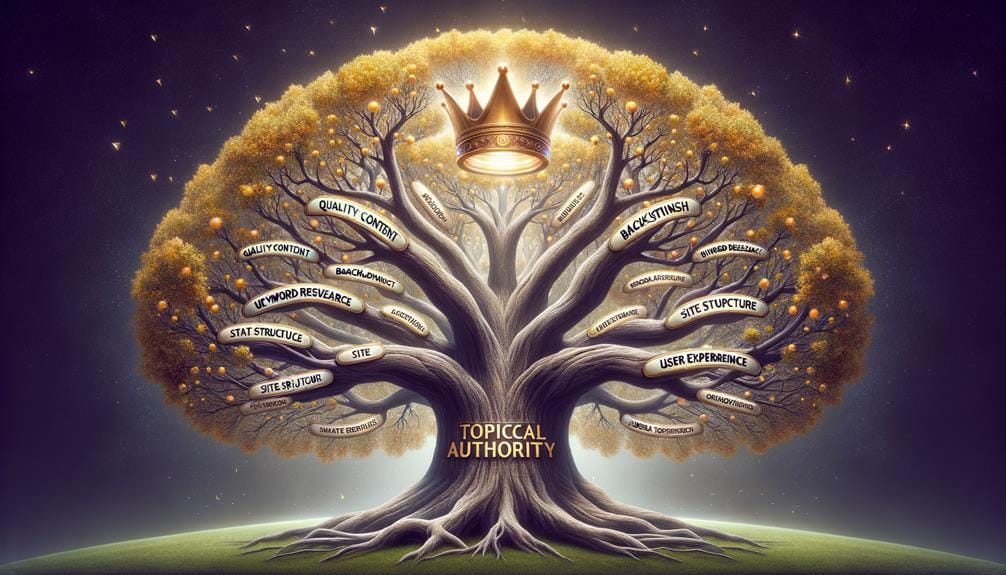Topical Authority in SEO refers to demonstrating thorough knowledge on a specific topic through the provision of high-quality and in-depth content. This method enhances website credibility and boosts Search Engine Ranking Positions (SERPs). Achieving topical authority involves strategies such as keyword gap analysis, creation of topic clusters, and alignment with search intent. It is essential that the content resonates with the user's motivations while exploring further into the subject. Monitoring metrics like organic traffic and user-engagement indicates topical authority. A deeper exploration into this subject reveals cultivating methods of topical authority and insights into its effect on conversions and brand recognition.
Key Takeaways
- Topical authority in SEO emphasizes expertise in specific subjects to enhance search engine rankings and credibility.
- It involves detailed content marketing, targeting specific keywords, and organizing content into topic clusters.
- Aligning content with user search intent and building quality backlinks from authoritative sites are key strategies for building topical authority.
- The impact of topical authority is measured through keyword rankings, organic traffic, backlinks, and user engagement metrics.
- Google's algorithms favor websites with strong topical authority, leading to higher rankings and increased visibility.
Understanding Topical Authority
To understand topical authority in SEO, one must recognize its core principle: becoming an expert in specific subjects to not only enhance search engine rankings but also establish credibility through thorough coverage of topics rather than focusing solely on individual keywords. This principle underlines the strategic shift from keyword-centric SEO to a more holistic, topic-oriented approach.
Google's algorithm values topical authority as it demonstrates a site's expertise and relevance. Websites with high topical authority are perceived as more reliable and trustworthy, consequently earning higher rankings in search results. Achieving this requires a detailed and analytical approach to content marketing, where the focus is on creating high-quality, relevant content that extensively covers a given topic.
Building topical authority also involves acquiring authoritative backlinks, which serve as endorsements of your content's credibility and relevance. Strategic SEO practices, such as this, contribute to a website's overall topical authority and its standing in search results.
In essence, topical authority in SEO is a validation of a website's expertise and reliability on a given topic, and is an important factor in enhancing visibility and credibility in Google's search results.
Importance of Topical Authority for SEO
Having established an understanding of what topical authority is, we can now examine its significant role in SEO strategies and its impact on a website's search engine rankings. The importance of topical authority in SEO cannot be overstated. It is crucial for establishing your site's expertise on specific topics, which directly influences your rankings on search engines.
A robust topical authority signals to search engines like Google that your site possesses a high level of expertise, authority, and trustworthiness (E-A-T), critical factors in determining search rankings. By demonstrating extensive knowledge and coverage of a particular topic, your site can become a trusted resource, leading to improved rankings and visibility.
Moreover, topical authority forms the backbone of a sustainable content strategy. By consistently producing high-quality, relevant content around a specific topic, your website can enhance its credibility and increase conversions. Additionally, it helps establish a strong brand association with relevant keywords, enhancing your website's discoverability.
Building Topical Authority: Strategies and Steps

Establishing topical authority requires a strategic approach, involving essential steps such as keyword research, content organization into topic clusters, alignment with search intent, and the development of relevant internal and external links.
Keyword research is the foundation for building topical authority. It helps identify gaps in the content and provides insights into the talking points that would resonate with the target audience. The aim is to create content that aligns with the search intent of these keywords, further solidifying the site's authority on the topic.
Content creation should be organized into topic clusters. This involves crafting pillar content that gives an overview of the topic, supported by related articles that explore specifics. This structure improves the user experience and helps search engines understand the breadth and depth of content on the website.
Link building, both internal and external, is another critical step. Internal links guide users through the content, creating a logical pathway that reinforces the topic's relevance. External links, on the other hand, lend credibility and affirm the site's connection to the broader industry conversation. Together, these strategies enhance the site's topical authority.
Measuring and Monitoring Topical Authority
After meticulously building topical authority through strategic content creation and link building, the next critical phase involves understanding how to measure and monitor this authority effectively. Measuring topical authority can be intricate due to the absence of a definitive method. However, methods such as Kevin Indig's approach, which leverages Ahrefs Keywords Explorer, provide a useful structure.
A robust way to gauge topical authority involves monitoring keyword rankings, organic traffic, backlinks, and user engagement metrics. The traffic share by domains report can also be a valuable proxy for evaluating topical authority. This report provides a clear picture of the website's standing in relation to competitors on the same topic.
Monitoring organic traffic is also pivotal as high levels of organic traffic indicate that the content is resonating with the target audience and is being favored by search engine algorithms. Similarly, a high volume of relevant backlinks and positive user engagement metrics suggest that the content has authority.
Ultimately, the key to maintaining topical authority lies in the ability to adapt strategies based on data insights. Regular analysis and strategic modifications based on these insights ensure the continued growth and maintenance of topical authority.
Enhancing Topical Authority Through Link Building

Enhancing topical authority in SEO is greatly influenced by strategic link building, with emphasis on the quality rather than the quantity of backlinks. It involves securing backlinks from industry-specific authoritative sites, thereby elevating the perceived credibility and expertise of your page. Additionally, strategic implementation of methods such as guest blogging, the Skyscraper Technique, Ego bait, and HARO, along with efficient internal linking, can prove instrumental in strengthening topical authority.
Quality Over Quantity
In the domain of SEO, a strategic emphasis on garnering quality links, rather than a sheer abundance of them, is pivotal in augmenting topical authority through adept link building. The value of a link is often determined by the authority of the site it originates from, making authoritative sites within your industry a key target for link acquisition.
Strategies such as guest blogging can be instrumental in procuring these quality links. By contributing high-value content to other respected platforms in your industry, you not only gain a quality backlink but also position yourself as an authority in your field.
Internal linking is another crucial component in establishing authority. By intelligently linking your content, you create a web of related topics that search engines can crawl, understanding the depth and breadth of your knowledge on a particular topic.
To sum up, the pursuit of topical authority through link building should prioritize:
- Quality links from authoritative sites within your industry.
- Utilizing guest blogging as a means to acquire these quality links.
- A thorough internal linking strategy to demonstrate the scope of your knowledge.
Strategies for Backlinks
While enhancing topical authority is a multifaceted endeavor, one of the most potent strategies incorporates the effective use of backlinks from reliable and authoritative sources within the industry. Quality backlinks are pivotal in establishing credibility and relevance within a given topic. They act as endorsements from other websites, signifying to search engines that your content is valuable and trustworthy.
One effective method for acquiring these backlinks is guest blogging. By writing content for reputable websites in your industry, not only do you gain exposure, but you also earn valuable backlinks. Similarly, the Skyscraper Technique can be employed. This strategy involves creating superior content around popular topics, then reaching out to sites that have linked to similar, less superior content, and encouraging them to link to your superior resource instead.
Another strategy is the use of Ego bait, where content is created to flatter and feature industry influencers, prompting them to share and link back to your content. Lastly, don't overlook internal linking. By connecting pillar pages with supporting content, you strengthen your website's topical authority. Remember, quality over quantity is key in backlink acquisition.
Understanding User Intent in SEO
In the domain of SEO, understanding user intent is pivotal to crafting content that aligns with the users' search motivations and enhances topical authority. This discussion will explore the process of decoding user search intent, evaluate its impact on SEO effectiveness, and strategize on optimizing content to meet various user intents. By mastering these aspects, we can create a more user-focused SEO strategy that boosts organic traffic and improves website ranking.
Decoding User Search Intent
To effectively engage our audience and boost SEO performance, understanding the underlying user search intent becomes crucial – the motive behind a user's search query that should guide our content creation for best relevance. This understanding allows us to tailor our content strategy to meet specific needs and provide value, leading to improved user experience and engagement.
Decoding user search intent involves a three-step process:
- Identifying Types of User Intent: Familiarize yourself with the different types of user intent – informational, navigational, transactional, and commercial investigation. Understanding these categories helps in predicting what a user is likely to search for.
- Conducting Keyword Research: This involves discovering and analyzing the keywords your audience uses when conducting searches. It not only provides insight into their needs but also informs your SEO strategy.
- Performing SERP Analysis: Analyzing the Search Engine Results Page (SERP) for specific keywords gives you a clear picture of what content is currently ranking and why.
Impact of User Intent
Acknowledging the important role of user intent in SEO can greatly enhance content alignment with searchers' needs, resulting in improved Google rankings and overall user satisfaction. User intent, the motive behind a search query, is a key factor in content creation. By analyzing user intent, marketers can tailor their content to meet these needs more effectively and provide a more satisfying user experience.
Google's algorithms have evolved to prioritize content that aligns closely with user intent, making it one of the major ranking factors in SEO. The search engine uses complex algorithms to assess the relevancy and quality of content in relation to the search query. Therefore, understanding user intent categories, including informational, navigational, transactional, and commercial investigation, is important.
Incorporating user intent into your SEO strategy not only improves your content's relevancy but also enhances its appeal to users. Analyzing user intent guides the creation of more engaging content that not only aligns with searchers' needs but also fosters a positive user experience. Consequently, understanding and leveraging user intent can have a significant impact on your SEO performance.
Optimizing for User Intent
Grasping the concept of user intent in SEO—a user's goal when conducting a search query—provides a strategic advantage in tailoring content to meet the specific needs or desires of searchers. By analyzing user behavior and search patterns, valuable insights can be gleaned to optimize for user intent. This involves matching content with the four main types of user intent: informational, navigational, transactional, and commercial investigation.
- Informational Intent: Users seeking knowledge or answers. Content should provide clear, accurate, and concise information.
- Navigational Intent: Users looking for a specific website or page. Make sure your site is easily navigable and visible in search results.
- Transactional Intent: Users intending to make a purchase. Your content should facilitate an easy and secure transaction process.
Optimizing for user intent not only increases the likelihood of ranking well in search results but also enhances user satisfaction, driving repeat visits and conversions. It's a strategic, analytical approach that puts the user's needs and desires at the forefront of SEO efforts. Understanding user intent is, as such, a critical aspect of developing a successful SEO strategy.
Benefits of Building Topical Authority

Establishing topical authority in SEO is crucial for any business for several reasons. In addition to enhancing the website's credibility, trustworthiness, and visibility on search engine result pages, it also opens the door to increased organic traffic, user engagement, and brand recognition. Developing topical authority is a powerful strategy that brings various advantages linked to enhanced SEO performance. This includes achieving higher rankings on search engine results, which directly translates to greater visibility of your content.
The process of building topical authority also promotes brand recognition. By consistently delivering high-quality content within a specific niche, a brand can establish itself as a trusted resource, leading to consumer trust and credibility. This strategic positioning can result in higher conversions and revenue, ultimately boosting the overall profitability of the business.
Moreover, the improved user engagement that comes with topical authority can cultivate consumer loyalty and help in building a loyal audience base. This not only expands the brand's reach but also solidifies its presence in the market. Therefore, the advantages of establishing topical authority in SEO are numerous, underscoring its importance in a successful digital marketing strategy.
SEO Techniques for Topical Authority
To bolster topical authority in SEO, one must employ a strategic combination of SEO techniques, including the creation of topic clusters, understanding user intent, optimizing site metadata structure, interlinking content, and incorporating relevant SEO indicators.
Topic clusters are a group of interlinked articles or content centered around a specific subject, often anchored by a pillar page. This SEO technique is instrumental in creating a cohesive, all-encompassing content strategy that boosts your site's topical authority.
Understanding user intent is also vital. By aligning your content with the needs and interests of your target audience, you enhance your site's relevance, thereby improving its topical authority.
Site metadata structure optimization involves curating your site's metadata – including titles, descriptions, and keywords – to maximize its visibility on search engines.
- Topic Clusters: By creating pillar pages and leveraging internal links, the creation of topic clusters allows for more organized, easily navigable content, improving user experience and SEO performance.
- User Intent: Understanding and aligning with user intent ensures the content is relevant and valuable to the audience, fostering trust and boosting topical authority.
- Site Metadata: Optimizing site metadata structure with relevant keywords and descriptive tags improves your site's visibility and elevates its topical authority.
Incorporating these SEO techniques can effectively augment your topical authority, guaranteeing your site's success.
Establishing Your Topical Authority

Establishing topical authority in the field of SEO is a strategic endeavor that involves the cultivation of expertise on a specific subject, aiming to enhance website credibility and improve search engine rankings. This process requires a detailed content strategy, focusing on thorough coverage of the topic at hand to demonstrate relevance and expertise to search engines.
Building authority in your chosen field is an integral part of this SEO concept. It involves creating high-quality, relevant content that effectively addresses user intent. This not only positions your website as an authoritative resource on the subject but also enhances your domain authority, a critical factor in SEO performance.
Moreover, acquiring authoritative backlinks from reputable sources can further strengthen your topical authority. Another key strategy is the use of internal links, which help in distributing page authority and link equity across your website. These practices collectively aid in improving the visibility of your content, making it easier for search engines to rank your content.
Importance of Content Depth and Quality
Recognizing the pivotal role of content depth and quality in SEO is essential for achieving topical authority. Thorough and high-quality content addresses user intent, aligns with specific search queries, and bolsters visibility, thereby improving SERP rankings. It is not merely the length, but the relevance, expertise, and breadth of information that constitute quality content depth, underscoring its significance in enhancing SEO effectiveness.
Evaluating Content Depth
In the domain of Search Engine Optimization (SEO), evaluating and prioritizing content depth serves as a fundamental strategy for enhancing the breadth and relevance of information, thereby avoiding issues related to thin content and improving search engine rankings. The depth of content signifies thorough coverage of the topic, and it's not merely about length but the quality and relevance of the information provided.
- Content depth and thorough coverage: Focusing on content depth guarantees that each topic covered on your website offers exhaustive information, showcasing your expertise and relevance in the subject. This not only enhances user experience but also increases your chances of ranking higher in search engine results.
- High-quality content and thin content: High-quality content depth is essential to avoiding thin content issues. Thin content, being sparse and lacking value, struggles to rank well in search engine result pages. Therefore, strategies for creating high-quality content should aim at providing depth.
- Aligning with user search intent: Content depth should align with user search intent, meaning it should adequately answer the queries of users. By doing so, you cater to your audience's needs and preferences, which can positively influence your search engine rankings.
Ensuring Quality Content
To guarantee quality content, it's vital to prioritize content depth and quality, as these are fundamental components that prevent thin content issues, boost topical authority, and thereby greatly enhance SEO performance. A thoughtful, thorough exploration of a subject, rather than mere length, defines topic depth. It ensures thorough coverage of a topic, thus avoiding thin content, which is often penalized by search engines due to its lack of in-depth information.
Strategically, to create high-quality content, it's important to align with the central theme, cover related subtopics, and meet the search intent effectively. Focusing on search intent helps to deliver content that answers users' queries accurately and comprehensively, further enhancing the perceived value of the content. This approach not only helps in establishing topical authority but also in building trust with the audience.
In essence, the role of quality content and topic depth is pivotal in SEO. It helps in avoiding thin content issues, provides thorough coverage of a topic, and meets the search intent, thereby improving the visibility and ranking of the website on search engine result pages.
Content Cluster Building and Regular Updates

Harnessing the power of content clusters and maintaining regular updates are strategic methods to bolster topical authority in SEO, consequently enhancing content organization, increasing visibility, and ensuring continued relevance. Content clusters group related pages around a central topic, offering an all-encompassing view of the subject and increasing the chances of higher rankings.
Regular updates, on the other hand, keep content fresh and relevant, a critical factor in SEO performance. An outdated page can be detrimental to site credibility, and hence, maintaining currency of information is indispensable.
- Content Clusters: These strategically group related content, offering a thorough coverage of a topic, and thereby improving visibility.
- Regular Updates: Maintaining the relevance and freshness of content is essential to prevent a drop in SEO performance due to outdated information.
- Monitoring: Tools like Ahrefs Traffic Share Report can help monitor the impact of these practices on topical authority, providing tangible metrics such as increased traffic.
Role of Backlinks in Topical Authority
Backlinks, particularly those of high quality, serve as an indispensable tool in achieving topical authority by signifying a website's relevance and credibility on a specific subject matter. A strategic approach towards acquiring authoritative backlinks can elevate a website's standing in the eyes of search engines, hence improving its overall SEO performance. Therefore, the process of crafting a robust backlink profile, marked by relevance and quality, emerges as an essential part of enhancing a website's topical authority.
Importance of Quality Backlinks
In the domain of search engine optimization, the importance of quality backlinks cannot be overstated as they play a crucial role in establishing and enhancing topical authority. Backlinks, especially those from authoritative websites, signify the credibility of your website's content to search engines. This credibility is essential in achieving a strong online presence, improving your website's ranking, and driving organic traffic.
High-quality backlinks from reputable sources can significantly enhance your site's authority on a specific topic. A backlink from a site with high topical authority signals to search engines that your content is relevant and trustworthy. This affirmation from trusted sources boosts your topical authority and improves your ranking for relevant keywords.
The process of acquiring quality backlinks should be strategic and focused on building a strong backlink profile. Consider the following:
- Prioritize authoritative sites within your niche for backlink opportunities.
- Make sure that your content is high quality, relevant, and informative to attract quality backlinks.
- Regularly audit your backlink profile to identify and remove low-quality links.
Building Relevant Backlinks Strategy
To effectively build topical authority in SEO, it is paramount to strategize on acquiring relevant backlinks from authoritative websites within your niche, as these not only signal credibility and expertise, but also greatly enhance search engine rankings and visibility.
A strategic approach to backlink building involves identifying and reaching out to industry leaders with strong domain authority. Convincing these authoritative websites to link to your content requires offering them something of value in return, such as detailed, original content that their audience would find useful.
Another strategy is to create link-worthy content that naturally attracts backlinks. This includes in-depth guides, original research, infographics, and case studies. These types of content are highly valuable to readers, making other websites more likely to link to them.
Additionally, consider leveraging partnerships and collaborations for link building. This includes guest posting on relevant blogs, participating in industry forums and events, and conducting webinars or podcasts with industry influencers. These activities not only provide opportunities for backlinks, but also help to establish your website as an authority in your niche.
The Impact of Google's Algorithms on Topical Authority

The advent of Google's Hummingbird algorithm in 2013 marked a pivotal shift in the domain of search engine optimization, placing a greater emphasis on in-depth authority through the prioritization of content relevance over mere keyword accumulation. This update was designed with the aim of better understanding user intent and context, thereby providing more accurate and relevant search engine results.
With this shift, the metrics for SEO success were fundamentally altered. Websites could no longer rely on keyword stuffing but had to demonstrate expertise and authority on the specific topics that users were seeking information on.
- Google's algorithms now prioritize detailed, high-quality content that demonstrates a deep understanding of the topic at hand.
- Websites with strong topical authority are more likely to rank higher in search engine results for relevant queries. This is a direct result of the Hummingbird update's emphasis on content relevance and user intent.
- Topical authority is no longer optional; it's a critical component of a successful SEO strategy. With the increasing sophistication of Google's algorithms, topical authority has become a key factor in establishing and maintaining a competitive edge in the digital landscape.
Future Trends in Topical Authority and SEO
As we look towards the future, evolving trends in topical authority and SEO are set to further revolutionize the digital marketing landscape. Central to these trends is the increased focus on user intent and search relevance, with AI and machine learning playing a significant role in understanding and predicting user behaviors. This detailed insight will enable the creation of more relevant, authoritative content, enhancing its topical authority.
Voice search optimization represents a new frontier in SEO strategies, with the use of featured snippets becoming more dominant. These concise answers to user queries not only improve search relevance but also contribute to the page's topical authority.
Additionally, personalization and localization of content will become vital in achieving top-ranking positions. Tailoring content to the user's specific needs and location will increase its relevance, thereby boosting its authority.

